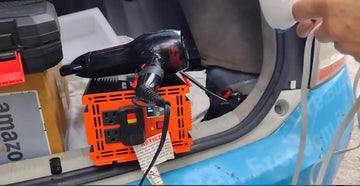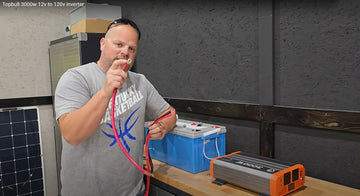How will you spend your relaxing holiday? Sleeping on soft grass? Or pitch a tent on the beach? Camping, my friend, is a great option!
But no matter where you want to camp, a mobile power supply is a must-have item when you're all off the grid. With a power source, you don't have to worry about your phone running out of juice and missing out on recording. You can also cook delicious food or turn on your laptop to watch a movie without worrying about running out of power!
So, this guide provides a comprehensive overview of how to choose the best lithium batteries for camping.
Why Choose Lithium Batteries for Camping?
Lightweight and Portable: For camping enthusiasts, storage space is at a premium. Lithium batteries are known for their lightweight design, making them ideal for use in campgrounds where space is at a premium. They are approximately 50% lighter than traditional lead acid batteries, making them easier to carry and transport during outdoor adventures. No more worrying about carrying bulky equipment that could take away from the fun of camping.
Longer Life: Lithium batteries can withstand more charge/discharge cycles, which means they last longer than other batteries, providing reliable power for multiple camping trips and avoiding the hassle of frequent replacements. That's why you can use lithium-ion batteries - which can easily last up to 5,000 cycles and about 15 years or more.
High energy density: Lithium-ion batteries are smaller and lighter, yet they store more energy than conventional batteries. This allows you to have smaller and lighter battery packs, while also extending the runtime of your camping equipment.
Fast Charging: Lithium batteries take less time to charge than other battery technologies (up to five times faster than traditional options). This means you can charge your batteries quickly and always have power to your devices when you're outdoors, even if your power supply is limited.
Power Output: Constant and stable power output is important when camping. Examples include portable refrigerators, fans, lights, or charging electronic devices such as smartphones, cameras, and GPS devices.
Low self-discharge rate: Lithium batteries have a low self-discharge rate, which means they can hold their charge for longer periods when not in use. This is great for campers who sometimes don't have access to charging facilities but need their batteries to stay charged for a long time. Imagine - how bad it would be when you decide to set off on a camping trip and realize that your batteries don't have enough charge.
Environmentally Friendly: Lithium batteries are more environmentally friendly than traditional batteries such as lead-acid batteries. They do not contain toxic substances such as lead or mercury, which reduces a camper's ecological footprint and makes them safer to use.
Durable: Lithium batteries are designed to withstand harsh outdoor conditions. They are typically built with a ruggedized case that can withstand the temperature changes, shocks, and vibrations that are common in camping activities.
Investing in lithium batteries is a smart way to ensure that your outdoor adventures are protected by the quality of your chosen energy source without sacrificing performance. They provide the convenience, performance, and durability your basic camping equipment needs to enhance your overall camping experience.
Factors to Consider When You Choose Lithium Batteries
Battery capacity: Consider the equipment to be operated and the operating hours, and select a battery capacity that will meet your energy requirements. For lithium batteries, the capacity is about 280mAh, which will provide about 280mAh of usable off-grid power. In comparison, lead-acid batteries typically only provide about half of their rated capacity.
Power Output: Check the power output information on the battery label to calculate the maximum discharge current and ensure that it will meet the power needs of your camping equipment. If you need to operate multiple devices at the same time or require higher power, choosing a lithium battery with a higher power output will better meet the demand.
Size and Weight: Ensure that the size of the selected battery fits into the designated battery compartment. Different devices may require different sizes of batteries, so choose the right size according to the device requirements.
Voltage: Lithium batteries come in a variety of rated voltages, such as 3.6V, 12.8V, 25.6V, and so on. Please make sure that the voltage of the selected battery matches the voltage requirement of the device. Using a battery of the wrong voltage may result in equipment damage or reduced operating efficiency, so be sure to match.
Charging Options: Evaluate the charging options of the selected lithium battery. Some batteries support solar charging or USB charging, while others may only be able to be charged using a standard outlet. Select the appropriate charging option based on your needs and the availability of charging sources.
Safety Features: Safety is critical when choosing a lithium battery. Make sure the battery you choose has built-in safety features such as overcharge protection, short circuit protection, and temperature monitoring. These safety features help prevent accidents while protecting the battery and equipment.
2024 Lithium Battery Comparison
Best for backpacking or hiking: 12.8V 20AH LiFePO4 Lithium Battery
A high-capacity, efficient, and lightweight battery is a backpacker's dream, and the TOPBULL 12.8V 20AH LiFePO4 Lithium Battery meets all of the said needs. Compact in size but not at the expense of power, it delivers an ample 256Wh of power, perfect for charging cell phones, cameras, flashlights, GPS, and other devices during outdoor adventures. Fully satisfy your needs on the adventure trail.
LiFePO4 batteries provide 2000 - 5000 cycles and a 10-year lifespan.8A continuous discharge current and wide operating temperature range. Compatible with small 100W solar panels allowing for sustainable off-grid charging.

Specifications
- Storage Capacity: 256Wh
- Charging Limit Voltage: 14.2V~14.4V
- Low Voltage Disconnect Voltage: 11.6V
- Resistance: 15 Milliohms
- Product Dimensions: 2.99"D x 7.08"W x 6.69"H
- Item Weight: 5.06 pounds
- Model: LiFePO4
- Depth of Discharge: 100%
- Charging Options: Solar/Battery Charger
Pros
- Small size and lightweight, perfect for hiking
- Compatible with solar panels for off-grid charging.
- The battery can last up to 10 years.
- Built-in BMS, easy and maintenance-free
Cons
- Limited capacity for larger installations
- Realization of off-grid use requires the purchase of additional solar panels
- Use with inverter
Best for car camping: 12.8V 100AH LiFePO4 Lithium Battery
This LiFePO4 Lithium Battery (12.8V 100AH ) is a perfect blend of power and portability, suitable for powering most household appliances. Feel the same comfort and convenience at home while getting in touch with nature. It is compatible with up to 400W solar panels for an eco-friendly camping experience.

Specifications
- Storage Capacity: 1280Wh
- Product Dimensions: 6.81"D x 12.99"W x 8.58"H
- Item Weight: 23.8 pounds
- Model: LiFePO4
- Depth of Discharge: 100%
- Charging Options: Charger/Solar/Generator
Pros
- Widely used
- Expansion of total capacity by parallel connection
- Fast charging, 20A, 5 hours
Cons
- Slightly heavier, but still portable for car camping.
- May provide more power than needed for simpler camping facilities
- Use with inverter
TOPBULL offers premium lithium-ion batteries made from 100% safe, non-toxic, renewable energy. It lasts longer and is safer than lead-acid batteries. They can support fast charging and solar panel charging.
Add-Ons for Your Lithium Battery
You can take your camping gear to the next level by investing in other add-ons, such as power inverters and solar panels. Not only will these items help you utilize your existing lithium battery power more efficiently, but they also offer greater versatility when it comes to powering any device that needs outdoor electricity. New gear brings more fun and new possibilities to your outdoor travels.
It allows you to convert the DC (direct current) power from your battery into AC (alternating current) power, which is commonly used by household appliances and electronics. With a power inverter, you can power and charge devices that require AC power while camping.


Choose the right gear for your needs. May you enjoy your time with nature!
FAQs
Q: Is 100Ah lithium enough for camping?
A: This depends on the devices you need to connect and work out their total daily consumption. Next consider whether to charge the battery during the camping trip, for example by choosing a campsite with a power connection or solar panel charging. If you are completely dependent on the capacity of the battery and have no reliable charging method, then minimize unnecessary energy loss as much as possible!
Q: What are the lithium battery charging options when camping?
A:1. charging via the grid provided by the camping site 2. using car power 3 solar panels 4. rechargeable battery charger
Q: How to maintain lithium batteries while camping outdoors?
A: 1. Avoid placing the lithium battery in a high or low-temperature environment. 2. Do not overcharge or discharge. 3. Pay attention to waterproofing. 4. Do not use incompatible chargers or charging cables.

















